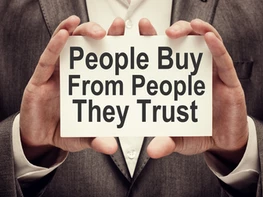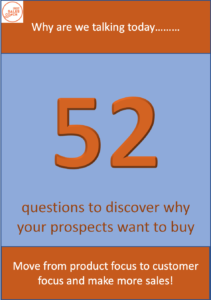
In an uncertain world customers are looking for certainty. Trust between buyer and seller helps to create certainty and an environment where purchase decisions are made.
In this blog I recommend three proven tactics building trust between buyer and seller.
Intuitively we know that trust between buyer and seller creates the environment to do business in. After all, would any of us do business with people or businesses we do not trust? The opposite is true instead: people buy from people they trust.
In today’s rapidly changing world full of uncertainties, trust is even more relevant as a successful strategy for sales success. Once trust has been established, the opportunity to sell will come along whether it is in shape of a tender or a next conversation. Trying to sell before trust has been established, is a dead end track.
Here are three tactics to start creating and maintaining trust with prospects and existing customers.
Sales people should position themselves as experts.
B2B salespeople should position themselves as experts in order to build trust and credibility with their prospects and customers. When prospects and customers see a salesperson as an expert in their field, it is easier to build a strong and lasting business relationship. An expert salesperson is also better equipped to provide the best advice and solutions for their customers’ needs. Additionally, positioning oneself as an expert can help differentiate the salesperson from their competitors and increase the perceived value of their services. Today customers still expect to learn from sales people as well as buy from them. Although 27% of buyers do extensive online research before speaking to a vendor, they do expect additional valuable information from the sales person. In addition Gartner* found that buyers are 2.8 times more likely to buy from vendors who have helped them with useful information during the buying process. Sales people need to make certain they know their products and services inside out and so building trust.
Here are two examples:
1) In the payments industry we saw additional focus on transaction disputes between consumer and retailer due to the impact of COVID-19. Retailers will turn to their payments providers for insight and advice to navigate through refund rules while minimising refunds where possible.
Payments sales professionals will need to know about chargebacks and refunds and why payment schemes introduced these features in the first place. This will help merchants in their decision making and develop further trust with their provider. That in turn will open up more sales opportunities in due course.
Do not oversell
Customers want feature rich products and solutions that are future proof, available now and cost effective. It is all too easy for a sales person to not tell the truth at the point of clinching the deal. Overselling or over-promising has a huge and sometimes irrecoverable impact on company reputation, future earnings, and also individual reputation. Any trust built up will soon vanish and may irrecoverable losing the customer. B2B salespeople should not oversell because it can lead to customer dissatisfaction. When a customer is promised something that cannot be delivered, they will feel misled and may be less likely to continue doing business with the company. Overselling can also cause customers to lose trust in the salesperson and the company, making it difficult to build long-term relationships. Finally, overselling can lead to customer complaints, decreased customer loyalty, and negative reviews which can damage the company’s reputation.
On the other hand, customers will appreciate a vendor that is clear and upfront about their solutions suitability. Of course, salespeople should be encouraged to push the line without crossing it, but they need to know where the line is and how far it can be flexed. When training salespeople, product knowledge, internal processes and selling techniques are all equally important to prevent overselling and build trust.
Ask questions and collaborate .
Trust can be developed by finding out what challenges a customer has. Asking questions is a powerful technique often underutilised by sales people. Here are ‘trust creating’ questions:
- What are the challenges?
- How are these challenges impacting the business, employees and customers?
- Why are they seen as challenges?
- Where do the challenges originate?
- What are the current workarounds?
- What has been tried to address the challenges so far?
- What should the ideal solution look like?
These questions expose pain or gain points during the selling process and also create trust. Sales people who ask questions like the ones above, allow customers to reflect on their situation or position. In addition, good questions ensure no money is left on the table during the selling process.
Working together on the challenges, options and agreeing next steps are signs of trust between buyer and seller.
conclusion
Certainty is in short supply in a rapidly changing world. Building and maintaining trust with customers is even more important now.
I work with sales professional developing and executing sales strategies with two objectives in mind: creating more sales opportunities and closing more deals. Get in touch to find out how I can help your sales team do the same.
sources used:
*Gartner ‘the new B2B buying journey’




